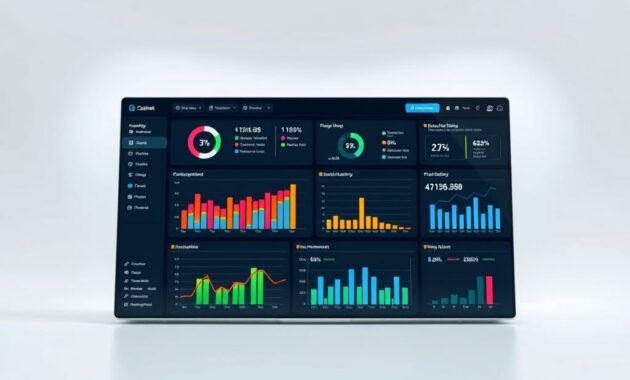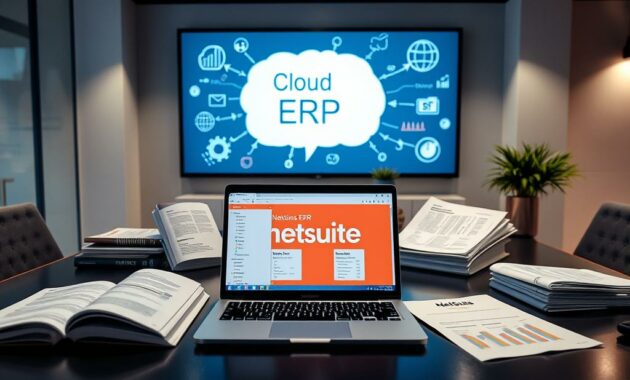Welcome to your gateway into the world of NetSuite! In this NetSuite 101 guide, we delve into the transformative impact of cloud ERP solutions on business operations. The contemporary business environment necessitates heightened efficiency, adaptability, and scalability. It is within this context that systems such as NetSuite excel. As more enterprises migrate to cloud-based platforms, grasping the capabilities of NetSuite becomes paramount for enhancing business efficiency. Join us as we uncover how this robust platform can optimize your operations and drive your organization’s advancement.
What is NetSuite?
NetSuite emerges as a vanguard in the domain of cloud ERP, offering a holistic platform for the management of various business operations with unparalleled efficiency. Since its inception over two decades ago, NetSuite has undergone a metamorphosis, providing functionalities that address a broad spectrum of business requirements. These include financial management, customer relations, and e-commerce, among others.
Overview of NetSuite as a Cloud ERP
This cloud-based ERP solution facilitates the consolidation of disparate processes into a unified system, thereby enhancing operational efficiency. NetSuite’s adaptable architecture enables the seamless integration of multiple business functions. This ensures real-time monitoring of operations without the necessity of utilizing disparate systems.
Key Features of NetSuite
- Real-time Reporting: Access up-to-date information to make informed decisions.
- Automation Capabilities: Streamline repetitive tasks, reducing manual effort and time.
- Customization Options: Tailor the platform to meet your specific business needs with various configurations.
Benefits of Using NetSuite for Business
The adoption of NetSuite yields substantial business advantages. It enables companies to achieve enhanced efficiency through automated processes, allowing teams to concentrate on tasks of greater value. Scalability is another critical benefit, as businesses can effortlessly scale their operations without the need for system changes. Furthermore, improved collaboration is facilitated through centralized data, enabling teams to work in concert more effectively and make decisions with greater alacrity.
How NetSuite Works
The operational dynamics of NetSuite elucidate its unparalleled efficiency and strategic advantages. Central to the functioning of contemporary enterprises are cloud-based systems, facilitating unimpeded data access from any location. This parity in access empowers both small and large businesses, obviating the disparities inherent in traditional on-premises systems. The cloud environment thus offers robust data management capabilities, devoid of the encumbrances associated with on-premises systems.
Understanding Cloud-Based Systems
Cloud-based systems embody significant flexibility and scalability, enabling companies to dynamically adjust their usage in response to demand. This adaptability contrasts sharply with the inflexible framework of conventional on-premise solutions, where upgrades are often cumbersome and time-consuming. Consequently, businesses can navigate the rapid evolution of technology without undergoing extensive overhauls.
The Architecture Behind NetSuite
The robust architecture of NetSuite is its cornerstone. Operating on a multi-tenant model, it efficiently allocates resources across all users. This model not only diminishes operational costs but also streamlines upgrades, ensuring that all users benefit from the latest functionalities without interruption. Businesses adopting this model can anticipate reduced downtime and consistent performance, essential in today’s fast-paced environment.
Integrating NetSuite with Other Applications
Application integration is pivotal in maximizing the efficacy of cloud systems. NetSuite provides diverse integration options, facilitating seamless connections with other business applications. By integrating with CRM, human resources, or eCommerce platforms, organizations can establish a unified operational framework. This integration enhances workflows and ensures data consistency across departments, fostering informed decision-making.
| Feature | Benefit |
|---|---|
| Multi-Tenant Architecture | Efficient resource sharing and cost reduction |
| Cloud Accessibility | Access data from anywhere, promoting flexibility |
| Application Integration | Unifies business processes and enhances data flow |
| Seamless Upgrades | Always have access to the latest features without downtime |
Key Modules within NetSuite
NetSuite’s comprehensive suite of modules addresses diverse aspects of business management, each module crucial for operational enhancement. We delve into the pivotal modules: financial management, CRM, and inventory management.
Financial Management Module
The financial management module within NetSuite is crafted to streamline financial processes. It encompasses:
- Budgeting and forecasting tools that enhance financial planning.
- Real-time visibility into financial performance to aid decision-making.
- Automated reporting features to simplify compliance and regulatory adherence.
Customer Relationship Management (CRM)
This module is dedicated to managing customer interactions to foster relationships and drive sales growth. It offers:
- Centralized customer data for better engagement and service.
- Sales automation tools that boost productivity and sales efficiency.
- Comprehensive analytics to track customer behavior and preferences.
Inventory and Supply Chain Management
The inventory management module offers full visibility over stock and supply chain processes. Its attributes include:
- Real-time inventory tracking to minimize stockouts and overstock situations.
- Automated replenishment systems that optimize supply levels.
- Integration capabilities with suppliers for seamless procurement.
Utilizing these NetSuite modules can significantly enhance financial management, CRM practices, and inventory management efficiency.
Getting Started with NetSuite
Initiating your journey with NetSuite may appear formidable at the outset. However, adopting a strategic approach to NetSuite setup can expedite this process, ensuring a rewarding experience. Mastery of the user interface is paramount, as it directly influences your productivity from the outset. By adhering to established new user best practices, you can adeptly harness the functionalities NetSuite provides.
Setting Up Your NetSuite Account
The foundational step of setting up your NetSuite account is of paramount importance. Begin by aggregating all requisite data, encompassing organizational specifics and user roles. Adherence to these pivotal steps is imperative:
- Initiate the registration process by entering your business particulars.
- Configure user roles and permissions to delineate access levels within the system.
- Personalize features to align with your unique business requirements.
Navigating the NetSuite Interface
The NetSuite user interface is crafted for ease of use. Mastery of its layout is crucial for unlocking its full potential. Focus on the following elements:
- Dashboard: Tailor it to display critical metrics you wish to monitor.
- Reports: Acquire proficiency in generating bespoke reports to dissect performance.
- Search Functions: Leverage advanced search functionalities for expedited data retrieval.

Best Practices for New Users
Embracing new user best practices can profoundly augment your experience with NetSuite. Consider the following recommendations:
- Utilize the system’s inherent help features to gain insights as you explore.
- Benefit from training resources, including documentation and online tutorials.
- Engage with community forums for peer support and shared knowledge.
- Periodically review your workflows and adjust settings as necessary to accommodate your evolving needs.
Customization and Flexibility
NetSuite presents a plethora of customization options, empowering you to mold the platform to your exact business specifications. Through the incorporation of custom fields, forms, and workflows, you can meticulously align the system with your operational paradigms. This adaptability not only augments the software’s versatility but also significantly enhances your management efficiency, thereby optimizing your business’s overall performance.
Tailoring NetSuite to Your Business Needs
The realm of NetSuite customization grants you the autonomy to alter numerous facets of the platform. Custom fields facilitate the tracking of data peculiar to your enterprise. The creation of bespoke forms simplifies data input, ensuring adherence to standardized protocols. Furthermore, workflow customization enables the automation of tasks, thereby facilitating the reduction of manual intervention, which in turn conserves time and resources.
Using SuiteApps and the SuiteCloud Platform
The integration of SuiteApps and the utilization of the SuiteCloud platform significantly broadens the capabilities of NetSuite. SuiteApps, being add-on applications, extend NetSuite’s core functionalities to address specific business needs. These applications offer solutions in domains such as project management, advanced reporting, and e-commerce integration. The SuiteCloud platform serves as a conduit for developers to craft and deploy custom applications, thereby facilitating the alignment of NetSuite with your unique operational requirements.
| Customization Features | Description | Benefits |
|---|---|---|
| Custom Fields | Fields tailored for unique business data | Track specific metrics and information |
| Custom Forms | Forms designed for specific data entry | Simplifies user experience and accuracy |
| Workflow Automation | Automated processes within NetSuite | Reduces manual tasks and improves efficiency |
| SuiteApps | Add-on applications to enhance functionality | Addresses specific needs within your business |
| SuiteCloud | Platform for developing custom applications | Consistency with your business requirements |
NetSuite Pricing and Editions
Grasping the nuances of NetSuite pricing is paramount for a judicious investment in this cloud ERP platform. The array of pricing models necessitates a precise alignment with your business’s unique requirements. Vigilance towards potential hidden costs is imperative for effective budgeting, thereby averting unforeseen expenses.
Understanding the Pricing Models
NetSuite proffers a spectrum of pricing models, tailored to accommodate diverse organizational scales and sectors. The fundamental framework encompasses:
- Subscription-based fees: Tied to monthly or annual commitments, contingent upon the service tier selected.
- User licenses: Incremental costs for each user, varying with the chosen edition.
- Add-ons: Expenses for supplementary modules or functionalities that augment the NetSuite experience.
- Transaction fees: Supplementary charges for voluminous transactions, pertinent to e-commerce and high-volume sales entities.
Choosing the Right Edition for Your Business
In the process of selecting a NetSuite edition, it is imperative to scrutinize your business’s specific requisites. Different editions present distinct functionalities, prompting an evaluation of:
- Your company size: Larger entities may necessitate more sophisticated capabilities.
- Industry-specific needs: Certain editions are more suited to particular sectors, such as retail or manufacturing.
- Future growth: Opt for an edition capable of accommodating your business’s expansion.
Hidden Costs to Consider
Despite a comprehensive grasp of NetSuite’s basic pricing, several hidden costs can arise. These may encompass:
- Implementation fees: Expenses linked to system setup and integration with existing systems.
- Customization charges: Costs for personalizing the system to fulfill specific needs.
- Training costs: Investment in employee education to optimize system utilization, which may incur additional expenses.
Implementation Strategies
The successful integration of NetSuite necessitates meticulous planning and execution. A strategic methodology is imperative for a seamless transition. Below, we present essential steps and transition tips to guide your organization through the NetSuite implementation journey.
Steps for Successful NetSuite Integration
Initiating with a clear roadmap is fundamental to a seamless NetSuite integration process. The following steps are crucial to consider:
- Define Objectives: Identify specific goals you aim to achieve with NetSuite.
- Assemble a Skilled Team: Form a project team comprising representatives from each department.
- Choose the Right Implementation Partner: Collaborate with an experienced NetSuite provider for expert guidance.
- Conduct a Needs Assessment: Analyze current processes and data requirements to inform system configuration.
- Establish a Comprehensive Timeline: Create a schedule that includes key milestones and deadlines.
- Plan for Data Migration: Develop a strategy for accurately transferring existing data into the new system.
Common Pitfalls to Avoid During Implementation
A successful NetSuite implementation can fall short due to common mistakes. Being aware of these pitfalls can save time and resources:
- Inadequate training for users can lead to low adoption rates.
- Underestimating the complexity of data migration may result in errors.
- Neglecting to communicate changes to stakeholders can cause resistance.
- Failing to set realistic timelines may lead to project delays.
- Ignoring data integrity checks can result in faulty reporting.
Tips for a Smooth Transition
Implementing NetSuite can be less daunting if you follow these transition tips:
- Provide comprehensive training sessions tailored to different user roles.
- Leverage automation tools to streamline data transfer processes.
- Encourage continuous feedback to address issues quickly.
- Establish a support system for users to seek help post-implementation.
- Monitor system performance regularly to ensure it meets business needs.
Training and Resources
The initiation of your NetSuite journey is a prospect that combines excitement with potential hurdles. To navigate this terrain, a plethora of training options are at your disposal, designed to enhance your proficiency. Each avenue is tailored to accommodate diverse learning preferences, ensuring that you select the most suitable method for your educational needs.
NetSuite Training Options Available
Multiple pathways for NetSuite training exist, including:
- Formal Training Programs: These structured courses deliver an in-depth exploration of essential topics, ensuring a comprehensive understanding.
- Webinars: Interactive sessions that offer direct access to NetSuite experts, fostering real-time engagement and the opportunity for immediate question resolution.
- Self-Paced Learning Materials: A flexible learning option that empowers you to progress at your own pace, utilizing a variety of educational resources such as videos, tutorials, and practical exercises.
Online Learning Resources and Communities
Participation in user communities can significantly augment your knowledge base. Seek out:
- Online Forums: Engage in discussions, share personal experiences, and derive insights from the collective wisdom of fellow users.
- Social Media Groups: Join dedicated forums focused on NetSuite, facilitating real-time dialogue and the exchange of knowledge.
Where to Find Documentation and Support
Access to reliable documentation support is paramount for effective troubleshooting. The official NetSuite documentation serves as a treasure trove of insights. It is advisable to consult:
- Help Center: A direct portal to comprehensive guides, articles, and step-by-step troubleshooting guides provided by NetSuite itself.
- Knowledge Base: A comprehensive repository of information addressing frequently encountered questions and common issues, ensuring that you can find solutions to your queries efficiently.

| Training Type | Description | Benefits |
|---|---|---|
| Formal Training | Structured courses in a classroom setting or virtual format. | Comprehensive understanding of NetSuite features. |
| Webinars | Interactive online sessions with experts. | Real-time engagement and Q&A opportunities. |
| Self-Paced Learning | Access to a variety of tutorials and videos. | Flexibility to learn at your convenience. |
NetSuite and Data Security
In a realm where data breaches can gravely affect enterprises, the imperative of robust NetSuite security cannot be overstated. Entities leveraging cloud ERP systems, such as NetSuite, must underscore data safeguarding through diverse functionalities and methodologies.
Security Features of NetSuite
NetSuite integrates a plethora of security functionalities to fortify data protection. These include:
- Role-based access control that restricts data access according to user roles, thereby ensuring that sensitive information is accessible only to those with proper authorization.
- Data encryption during transmission, which protects information against interception during transfers.
- Two-factor authentication to augment login security, thereby reducing the risk of unauthorized access.
Best Practices for Protecting Your Data
Despite the presence of robust NetSuite security measures, users must adhere to best practices to further fortify data protection:
- Regularly update user permissions in accordance with evolving roles within your organization.
- Conduct routine security audits to identify and rectify potential vulnerabilities.
- Educate employees on data security policies and foster a culture of vigilance against phishing attempts.
Compliance with US Regulations
Data protection mandates such as GDPR and CCPA necessitate organizations to adhere to stringent compliance standards. NetSuite facilitates businesses in aligning with these regulations by offering:
- Tools for managing customer consent and preferences, ensuring compliance with legal mandates.
- Comprehensive data audit logs that track user activity and alterations to sensitive information.
- Support for reporting and data request fulfillment, facilitating compliance with legal obligations.
Success Stories
An examination of NetSuite success stories unveils the transformative impact of this ERP system on diverse enterprises. Each case study delineates the specific hurdles encountered and the tangible benefits reaped through NetSuite’s implementation. This showcases its versatility and effectiveness across multiple sectors.
Case Studies of Businesses Using NetSuite
| Company | Industry | Challenge | Solution | Results |
|---|---|---|---|---|
| Apparel Co. | Retail | Inefficient inventory management | Implemented NetSuite’s Inventory Management Module | Reduced stocktaking time by 30%, leading to a 20% increase in sales. |
| Tech Innovations | Technology | Slow order processing | Integrated NetSuite with CRM and eCommerce | Improved order processing speed by 40% and enhanced customer satisfaction. |
| Food Distributors Inc. | Wholesale | Lack of visibility in supply chain | Utilized NetSuite’s Supply Chain Management tools | Achieved real-time visibility and decreased delivery times by 25%. |
How to Measure the Success of Your NetSuite Implementation
Assessing the success of NetSuite implementation is paramount for gauging its efficacy and pinpointing areas for enhancement. Key performance indicators (KPIs) are pivotal in this assessment. Focus on the following metrics:
- Processing Times: Compare transaction completion times pre- and post-implementation.
- Revenue Growth: Monitor sales and profitability enhancements stemming from operational optimization.
- Customer Satisfaction: Evaluate feedback and retention rate improvements.
- Operational Costs: Analyze overhead reductions resulting from efficient resource allocation.
Future Trends in Cloud ERP
The realm of cloud ERP is undergoing a perpetual metamorphosis, propelled by innovation and the exigencies of users. It is imperative to grasp the implications of these transformations on your interaction with systems such as NetSuite. The progression of cloud ERP is a testament to technological advancements, which are pivotal in augmenting operational efficacy and strategic decision-making acumen. By discerning emerging trends, you can fortify your organization’s preparedness for impending developments.
The Evolution of ERP Solutions
ERP solutions have undergone a profound metamorphosis, transitioning from traditional on-premise deployments to adaptable cloud-based systems. This transformation has endowed businesses with enhanced flexibility, accessibility, and integration capabilities. The adoption of automated processes, fueled by real-time data, facilitates informed decision-making. The paradigm shift towards cloud ERP resonates with the escalating demand for agility and responsiveness in the contemporary market.
Emerging Trends You Should Watch
As the cloud ERP domain continues to evolve, several pivotal emerging trends are gaining prominence:
- Integration of artificial intelligence (AI) and machine learning for predictive analytics and enhanced forecasting.
- Advanced analytics tools that empower users to extract actionable insights from their data.
- An increased focus on user experience, aiming to render systems more intuitive and user-friendly.
- Enhanced mobile capabilities to facilitate remote work and real-time decision-making.
- A heightened emphasis on cybersecurity to safeguard sensitive business data.
What’s Next for NetSuite Users
For both current and prospective NetSuite users, the forthcoming horizon is replete with promising prospects. Enhancements in functionality promise to integrate cutting-edge technology into everyday operations. As you navigate your options, remain vigilant for:
- Upgraded features empowered by AI and advanced analytics.
- Customizable dashboards that cater to specific user requirements.
- Innovative applications and SuiteApps designed to streamline business processes.
- Regular updates that facilitate seamless adaptation to new trends.
Anticipating these future trends will position you advantageously in a rapidly evolving business milieu. By remaining abreast of the cloud ERP evolution, you can make strategic decisions that harmonize with technological progressions, thereby ensuring your organization’s competitiveness.
Conclusion
In summarizing our NetSuite overview, it is evident that this cloud ERP solution encompasses a wide range of functionalities aimed at optimizing your business operations. We dissected pivotal modules such as Financial Management, CRM, and Inventory Management, illustrating their synergy in augmenting your operational efficiency. The adoption of NetSuite not only enhances operational efficiency but also affords the adaptability necessary for customizing the solution to align with your distinct business needs.
Recap of Key Points Covered
Our examination of NetSuite’s capabilities underscored its architecture, integration capabilities, and the paramount role of security in protecting your data. The significance of training resources and implementation strategies in shaping your experience cannot be overstated. The platform’s flexibility, enabled through SuiteApps and SuiteCloud, empowers you to personalize NetSuite to suit your exact requirements. This knowledge equips you to maximize the platform’s capabilities effectively.
Next Steps for Exploring NetSuite Further
As you contemplate your next move, delve into modules that pique your interest or engage with the myriad training resources at your disposal. Whether through attending workshops, exploring online forums, or initiating a trial, taking proactive steps will enable you to witness firsthand NetSuite’s potential to revolutionize your business. Seize this opportunity to leverage the full potential of a cloud ERP solution, one that is meticulously tailored to your specific needs.



